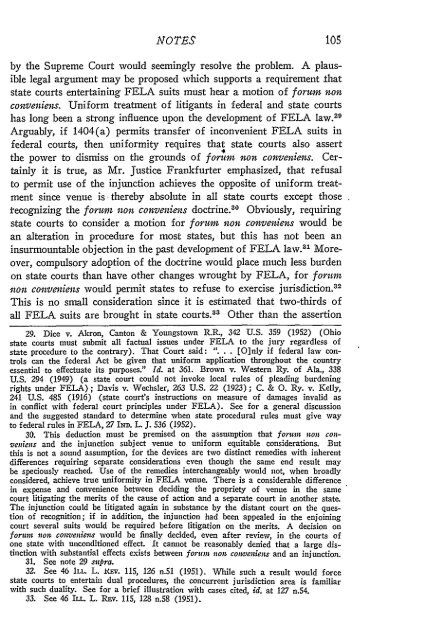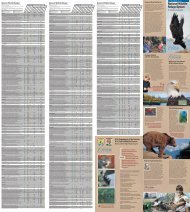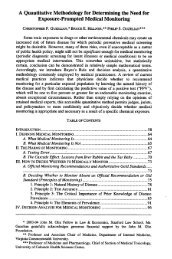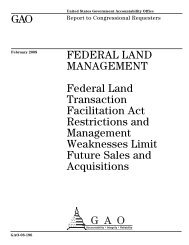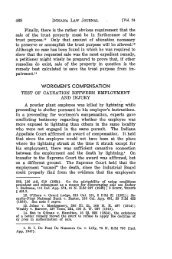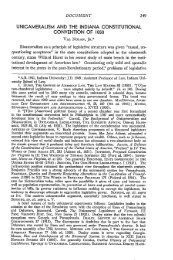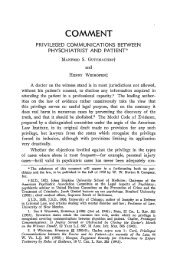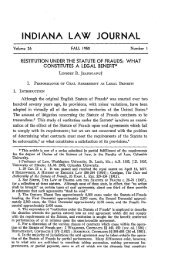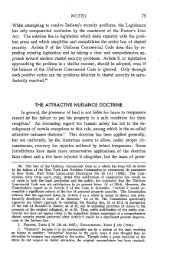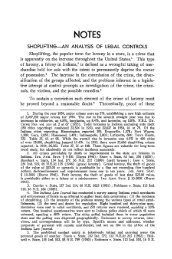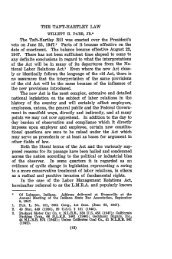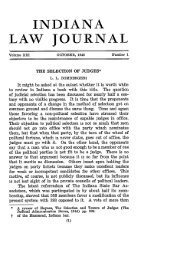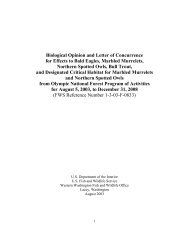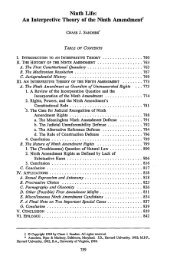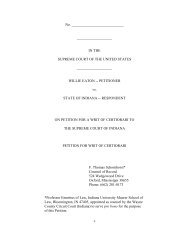fela venue abuse: necessity for congressional amendment
fela venue abuse: necessity for congressional amendment
fela venue abuse: necessity for congressional amendment
You also want an ePaper? Increase the reach of your titles
YUMPU automatically turns print PDFs into web optimized ePapers that Google loves.
NOTES<br />
by the Supreme Court would seemingly resolve the problem. A plausible<br />
legal argument may be proposed which supports a requirement that<br />
state courts entertaining FELA suits must hear a motion of <strong>for</strong>um non<br />
conveniens. Uni<strong>for</strong>m treatment of litigants in federal and state courts<br />
has long been a strong influence upon the development of FELA law. 29<br />
Arguably, if 1404(a) permits transfer of inconvenient FELA suits in<br />
federal courts, then uni<strong>for</strong>mity requires that state courts also assert<br />
the power to dismiss on the grounds of <strong>for</strong>um non conveniens. Certainly<br />
it is true, as Mr. Justice Frankfurter emphasized, that refusal<br />
to permit use of the injunction achieves the opposite of uni<strong>for</strong>m treatment<br />
since <strong>venue</strong> is thereby absolute in all state courts except those<br />
i-ecognizing the <strong>for</strong>um non conveniens doctrine. 30 Obviously, requiring<br />
state courts to consider a motion <strong>for</strong> <strong>for</strong>um non conveniens would be<br />
an alteration in procedure <strong>for</strong> most states, but this has not been an<br />
insurmountable objection in the past development of FELA law. 31 Moreover,<br />
compulsory adoption of the doctrine would place much less burden<br />
on state courts than have other changes wrought by FELA, <strong>for</strong> <strong>for</strong>um<br />
non conveniens would permit states to refuse to exercise jurisdiction. 32<br />
This is no small consideration since it is estimated that two-thirds of<br />
all FELA suits are brought in state courts. 33 Other than the assertion<br />
29. Dice v. Akron, Canton & Youngstown R.R., 342 U.S. 359 (1952) (Ohio<br />
state courts must submit all factual issues under FELA to the jury regardless of<br />
state procedure to the contrary). That Court said: ". . . [Olnly if federal law controls<br />
can the federal Act be given that uni<strong>for</strong>m application throughout the country<br />
essential to effectuate its purposes." Id. at 361. Brown v. Western Ry. of Ala., 338<br />
U.S. 294 (1949) (a state court could not invoke local rules of pleading burdening<br />
rights under FELA); Davis v. Wechsler, 263 U.S. 22 (1923); C. & 0. Ry. v. Kelly,<br />
241 U.S. 485 (1916) (state court's instructions on measure of damages invalid as<br />
in conflict with federal court principles under FELA). See <strong>for</strong> a general discussion<br />
and the suggested standard to determine when state procedural rules must give way<br />
to federal rules in FELA, 27 IND. L. J. 536 (1952).<br />
30. This deduction must be premised on the assumption that <strong>for</strong>umn non conveniens<br />
and the injunction subject <strong>venue</strong> to uni<strong>for</strong>m equitable considerations. But<br />
this is not a sound assumption, <strong>for</strong> the devices are two distinct remedies with inherent<br />
differences requiring separate considerations even though the same end result may<br />
be speciously reached. Use of the remedies interchangeably would not, when broadly<br />
considered, achieve true uni<strong>for</strong>mity in FELA <strong>venue</strong>. There is a considerable difference<br />
in expense and convenience between deciding the propriety of <strong>venue</strong> in the same<br />
court litigating the merits of the cause of action and a separate court in another state.<br />
The injunction could be litigated again in substance by the distant court on the question<br />
of recognition; if in addition, the injunction had been appealed in the enjoining<br />
court several suits would be required be<strong>for</strong>e litigation on the merits. A decision on<br />
<strong>for</strong>um non conveniens would be finally decided, even after review, in the courts of<br />
one state with unconditioned effect. It cannot be reasonably denied that a large distinction<br />
with substantial effects exists between <strong>for</strong>um non conveniens and an injunction.<br />
31. See note 29 supra.<br />
32. See 46 ILL. L. K'v. 115, 126 n.51 (1951). While such a result would <strong>for</strong>ce<br />
state courts to entertain dual procedures, the concurrent jurisdiction area is familiar<br />
with such duality. See <strong>for</strong> a brief illustration with cases cited, id. at 127 n.54.<br />
33. See 46 ILL. L. REv. 115, 128 n.58 (1951).


